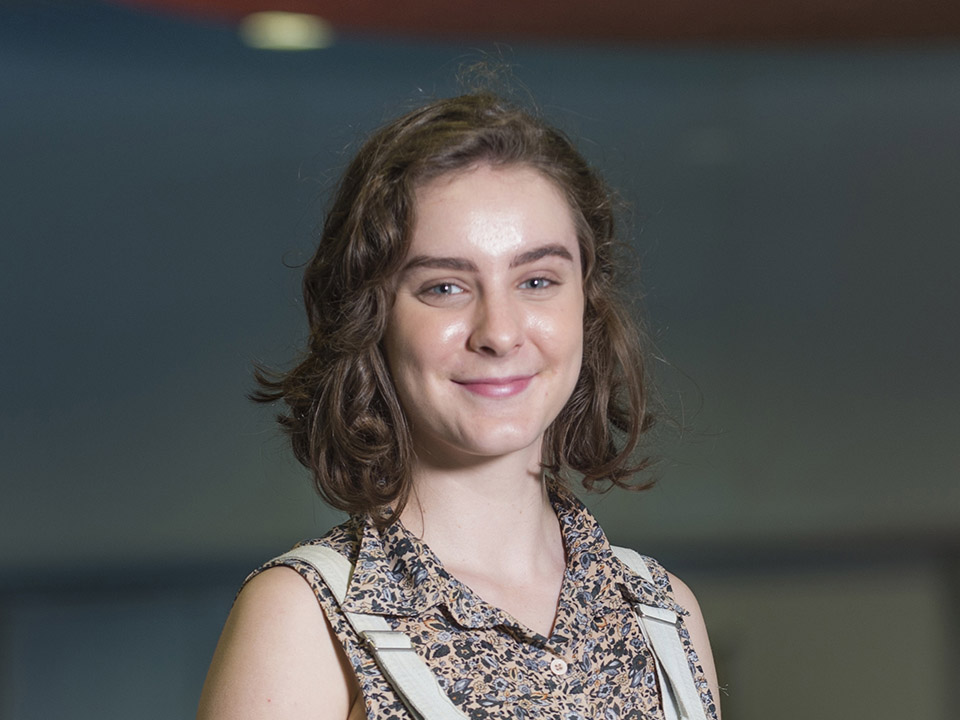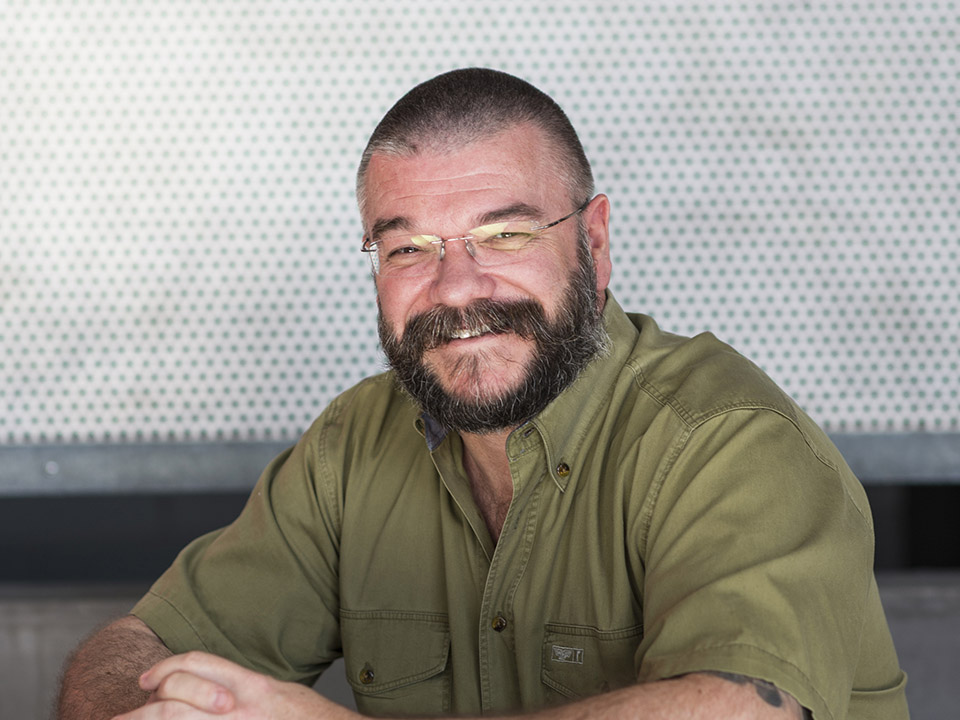Ethical design
‘I think the most valuable projects I have worked on at university emphasised the importance of people in the planning process, to effectively plan the places and spaces that they will interact with firsthand. Learning how to ethically and meaningfully facilitate stakeholder engagement is what makes planning projects truly sustainable, setting up the community for their own success into the future.’
Bachelor of Built Environment (Honours) (Urban and Regional Planning) / Bachelor of Science (Environmental Science)
Design sustainably
'I chose to study at QUT as I was interested in the opportunity to study urban environments internationally. I had the opportunity to participate in QUT's exchange program for a semester at the University of Alabama. This overseas experience nurtured my interest in urban and regional planning, where I have learnt about both the theory and application of implementing sustainable and effective practices within the built environment.'
Bachelor of Built Environment (Honours) (Urban and Regional Planning)
Align your studies with your passion
'I like environmental science because it combines a lot of different scientific disciplines into the one. There's chemistry, geology and biology. In environmental science, they all come together.'
Environmental science student
Ethical design
‘I think the most valuable projects I have worked on at university emphasised the importance of people in the planning process, to effectively plan the places and spaces that they will interact with firsthand. Learning how to ethically and meaningfully facilitate stakeholder engagement is what makes planning projects truly sustainable, setting up the community for their own success into the future.’
Bachelor of Built Environment (Honours) (Urban and Regional Planning) / Bachelor of Science (Environmental Science)
Design sustainably
'I chose to study at QUT as I was interested in the opportunity to study urban environments internationally. I had the opportunity to participate in QUT's exchange program for a semester at the University of Alabama. This overseas experience nurtured my interest in urban and regional planning, where I have learnt about both the theory and application of implementing sustainable and effective practices within the built environment.'
Bachelor of Built Environment (Honours) (Urban and Regional Planning)
Highlights
- Bring social and natural sciences together to create solutions for complex planning issues and pressing environmental problems.
- Prepare urban systems for climate change by learning to design carbon neutral cities and spaces ahead of the climate positive 2032 Brisbane Olympic and Paralympic Games (Queensland Department of Environment and Science).
- Learn from academics who are leaders in their fields, including Professor Tan Yigitcanlar, Australia's top researcher in urban studies and planning (Australian Research Magazine, 2024).
- Set yourself up for a rewarding career as an environmental scientist or an urban and environmental planner and be part of the solution to complex global challenges.
- QUT is ranked in the top 100 universities in the world for architecture and built environment (QS World University Rankings by Subject, 2023).
- Plan large-scale developments including cities, suburbs, ports, recreational and industrial areas and transport infrastructure that are sustainable and backed by science.
- Graduates are eligible for membership of the Environment Institute of Australia and New Zealand and a variety of other scientific societies, including the Soil Science Society of Australia and the Ecological Society of Australia.
Highlights
- QUT is ranked as one of the top 100 universities in the world and fifth in Australia for architecture and built environment (QS World University Rankings by Subject, 2024).
- Prepare urban systems for climate change by learning to design carbon neutral cities and spaces ahead of the climate positive 2032 Brisbane Olympic and Paralympic Games.
- Learn from academics who are leaders in their fields, including Professor Tan Yigitcanlar, Australia's top researcher in urban studies and planning (Australian Research Magazine, 2024).
- Bring social and natural sciences together to create solutions for complex planning issues and pressing environmental problems.
- Set yourself up for a rewarding career as an environmental scientist or an urban and environmental planner and be part of the solution to complex global challenges.
- Plan large-scale developments including cities, suburbs, ports, recreational and industrial areas and transport infrastructure that are sustainable and backed by science.
- Graduates are eligible for membership of the Environment Institute of Australia and New Zealand and a variety of other scientific societies, including the Soil Science Society of Australia and the Ecological Society of Australia.
Why choose this course?
In this exciting double degree, you will learn to design and plan urban environments, informed by science, with positive impacts on human health, environmental quality, social relationships, and local, regional and global urban systems.
This course will provide you with real life exposure to many aspects of the planning and design industries underpinned by a strong understanding of environmental science so you can develop the knowledge and practical skills that will prepare you for a rewarding career in sustainable design.
Acquire skills in data analysis and spatial modeling to make evidence-based decisions in urban planning. By leveraging scientific data and technology, you can analyse trends, forecast impacts, and optimise resource allocation for more effective urban development projects.
With a focus on scientific principles, you can help communities mitigate risks, respond effectively to emergencies, and build resilience against natural disasters and climate-related challenges.
Explore this course
The Bachelor of Built Environment (Honours)/Bachelor of Science is an undergraduate double degree consisting of 480 credit points and is normally completed in five years of full-time study or the equivalent part-time study.
Students are required to complete 276 credit points from the Bachelor of Built Environment (Honours) component, 144 credit points from the Bachelor of Science component, 36 credit points from a common content component, and 24 credit points of QUT You.
- Bachelor of Built Environment (Honours) component: You must complete the 264 credit point major along with a core 12 credit point work integrated leaning (WIL) unit.
- Bachelor of Science component: You must complete 48 credit points of science core units, and 96 credit points of your selected science major.
Choose from majors in climate science or environmental science to support your double degree with sound knowledge in global change, sustainability, air and water quality and climate change mitigation measures.
Gain sought-after skills in data analysis, problem-solving, and communication to make a meaningful impact on the forefront of climate science. Engage with real-world scenarios like climate hazards affecting Australia's social cohesion, human health, environment, infrastructure, and economy. Drive innovative solutions, influence policies, and empower communities through a course emphasizing climate science, ocean-atmosphere interaction, global change, sustainability, air and water quality, and climate change mitigation. Equip yourself to address challenges in sea level change mitigation, local climate adaptation, sustainable resource management, and coastal ocean climate mitigation.
Acquire skills in environmental planning and management to address global challenges like climate change and wildlife conservation. Contribute solutions to environmental issues including climate change, air, water, and soil quality, and water resources. Learn through theoretical, practical, and field classes with real-world industry examples. Benefit from guest lectures, site visits, and work-integrated learning for practical industry experience. Access advanced laboratories and fieldwork opportunities in Australia with top-notch faculty in their respective research fields.
The Bachelor of Built Environment (Honours)/Bachelor of Science is an undergraduate double degree consisting of 480 credit points and is normally completed in five years of full-time study.
Students are required to complete 276 credit points from the Bachelor of Built Environment (Honours) component, 144 credit points from the Bachelor of Science component, 36 credit points from a common content component, and 24 credit points of QUT You.
- Bachelor of Built Environment (Honours) component: You must complete the 264 credit point major along with a core 12 credit point work integrated leaning (WIL) unit.
- Bachelor of Science component: You must complete 48 credit points of Science core units, and 96 credit points of your selected Science Major.
Choose from majors in Climate Science or Environmental Science to support your double degree with sound knowledge in global change, sustainability, air and water quality and climate change mitigation measures.
Gain sought-after skills in data analysis, problem-solving, and communication to make a meaningful impact on the forefront of climate science. Engage with real-world scenarios like climate hazards affecting Australia's social cohesion, human health, environment, infrastructure, and economy. Drive innovative solutions, influence policies, and empower communities through a course emphasising climate science, ocean-atmosphere interaction, global change, sustainability, air and water quality, and climate change mitigation. Equip yourself to address challenges in sea level change mitigation, local climate adaptation, sustainable resource management, and coastal ocean climate mitigation.
Acquire skills in environmental planning and management to address global challenges like climate change and wildlife conservation. Contribute solutions to environmental issues including climate change, air, water, and soil quality, and water resources. Learn through theoretical, practical, and field classes with real-world industry examples. Benefit from guest lectures, site visits, and work-integrated learning for practical industry experience. Access advanced laboratories and fieldwork opportunities in Australia with top-notch faculty in their respective research fields.
Careers and outcomes
Employment opportunities abound at all levels of government as well as industry, community organisations and private consultancies working on all aspects of development and planning, sustainability initiatives, environmental policy, urban ecology and biodiversity, community development, urban planning and environmental management.
Professional recognition
Graduates are eligible for membership of the Environment Institute of Australia and New Zealand and a variety of other scientific societies, including the Soil Science Society of Australia and the Ecological Society of Australia (applicable to the environmental science major). The Bachelor of Built Environment (Honours) (Urban and Regional Planning) is accredited by the Planning Institute of Australia, our students and graduates are eligible to join the Institute.
Possible careers
- Environmental consultant
- Environmental planner
- Environmental scientist
- Geographer
- Land development manager
- Marine scientist
- Strategic planner
- Transport planner
- Urban and regional planner
- Urban planner
- Wildlife biologist
- ATAR/selection rank threshold
- 70.00
These thresholds are the lowest adjusted scores to which QUT made an offer in Semester 1, 2025.
Don't have a ATAR/selection rank?
- Course code
- ID55
- QTAC code
- 409992
- CRICOS code
- 116501D
-
- Gardens Point
-
- Gardens Point
- 5 years full-time
- 5 years full-time
- February and July
- February and July
Assumed knowledge
Before you start this course, we assume you have sound knowledge of the subject/s listed below. If you don't have the subject knowledge, you can still apply for the course but we strongly encourage you to undertake bridging studies to gain the knowledge:
- English, or Literature, or English and Literature Extension, or English as an Additional Language (Units 3 & 4, C)
- Mathematical Methods, or Specialist Mathematics (Units 3 & 4, C)
Year 12 early offer scheme
If you're a current Queensland Year 12 student, you may be eligible to receive an offer for this course on the last day of Queensland Year 12, before receiving your ATAR or selection rank.
Offer guarantee
If you achieve an ATAR or selection rank of 70.00 or higher (including any adjustments) and satisfy all other admission requirements, you are guaranteed an offer for this course.
VET guarantee
If you have completed an AQF certificate IV, diploma or higher, and satisfy all other admission requirements, you are guaranteed an offer for this course.
Advanced standing
If you have prior studies or work experience, you may be eligible for advanced standing (credit). You can apply for advanced standing once you've been accepted to QUT. If you're in your first semester of study, you must apply for advanced standing within 10 days of receiving your offer.
Deferment
You can defer your offer and postpone the start of your course for one year.
More about deferring your offer
Adjustments to your ATAR/selection rank
Any adjustments you receive to your ATAR or selection rank will be applied to this course.
Find out if you’re eligible for an adjustment to your ATAR or selection rank
Offers we made to school leavers in Semester 1, 2024
As this is a new course, Semester 1, 2024 information is not available.
You can find out more about your fellow students’ backgrounds with this course’s student profile.
Other admission options
If you are of Aboriginal or Torres Strait Islander descent, you may be eligible for admission through our Centralised Assessment Selection Process (CASP).
I completed my studies outside of Australia
Select the country where you completed your studies to see a guide to the grades you need to apply for this course.
If your country or qualification is not listed, you can still apply for this course and we will assess your eligibility.
Assumed knowledge
- Mathematical Methods, or Specialist Mathematics (Units 3 & 4, C)
You must have achieved this study at a level comparable to Australian Year 12 or in recognised post-secondary studies.
I completed secondary school in Australia
Assumed knowledge
Before you start this course we assume you have sound knowledge in these areas:
- Mathematical Methods, or Specialist Mathematics (Units 3 & 4, C)
- ATAR/selection rank
- 70.00
Offer guarantee
If you completed secondary school in Australia and achieve an ATAR/selection rank of 70.00 or higher (including any adjustments) and satisfy all other admission requirements, you are guaranteed an offer for this course.
VET guarantee
If you have completed an AQF certificate IV, diploma or higher, and satisfy all other admission requirements, you are guaranteed an offer for this course.
Minimum English language requirements
Select the country where you completed your studies to see a guide on meeting QUT’s English language requirements.
Your scores and prior qualifications in English-speaking countries are considered. Approved English-speaking countries are Australia, Canada, England, Ireland, New Zealand, Scotland, United States of America and Wales.
If your country or qualification is not listed, you can still apply for this course and we will assess your eligibility.
We accept English language proficiency scores from the following tests undertaken in a secure test centre. Tests must be taken no more than 2 years prior to the QUT course commencement.
| English Test | Overall | Listening | Reading | Writing | Speaking |
|---|---|---|---|---|---|
| IELTS Academic / One Skill Retake | 6.5 | 6 | 6 | 6 | 6 |
|
Cambridge English Score
You must share your results with QUT through the Candidate Results Online website. |
176 | 169 | 169 | 169 | 169 |
| PTE Academic | 58 | 50 | 50 | 50 | 50 |
| TOEFL iBT | 79 | 16 | 16 | 21 | 18 |
Don't have the English language score you need? We can help!
We offer English language programs to improve your English and help you gain entry to this course.
When you apply for this course, we will recommend which English course you should enrol in.
Your actual fees may vary depending on which units you choose. We review fees annually, and they may be subject to increases.
2026 fees
2026: CSP $10,000 per year full-time (96 credit points)
2026 fees
2026: $43,700 per year full-time (96 credit points)
2025 fees
2025: CSP $9,600 per year full-time (96 credit points)
2025 fees
2025: $41,700 per year full-time (96 credit points)
Student services and amenities fees
You may need to pay student services and amenities (SA) fees as part of your course costs.
HECS-HELP: loans to help you pay for your course fees
You may not have to pay anything upfront if you're eligible for a HECS-HELP loan.
You can apply for scholarships to help you with study and living costs.
International Merit Scholarship
A high achievement scholarship for future international undergraduate and postgraduate students.
- Scholarship eligibility
- Academic performance
International Talent Scholarship
A new scholarship for 2026 that covers tuition fees, with eligibility based on your prior academic achievements.
- Scholarship eligibility
- Academic performance
Keep up to date
Ready for your next step?
Finishing school?
Everything you need to know about choosing a uni straight from school.
How to apply
We'll break down the application process, from QTAC to accepting your offer.
Ready for your next step?
How to apply
We'll break down the process, from applying to accepting your offer.
Flexible study
Explore the options that could make postgraduate study work for you.
QUT courses for you
Like to save your courses?
Please enter your first name and email so we can save your courses for you






